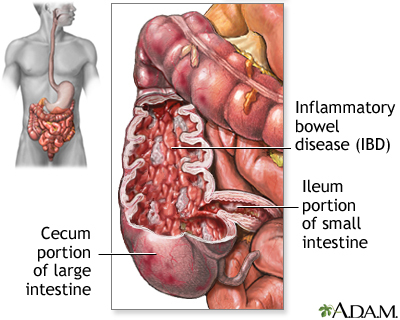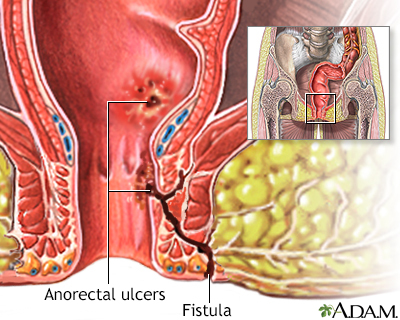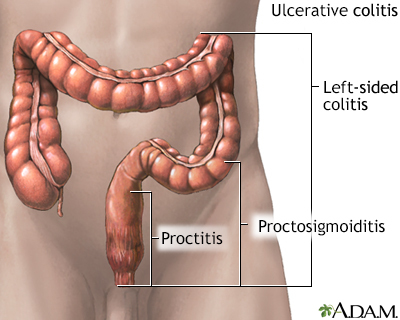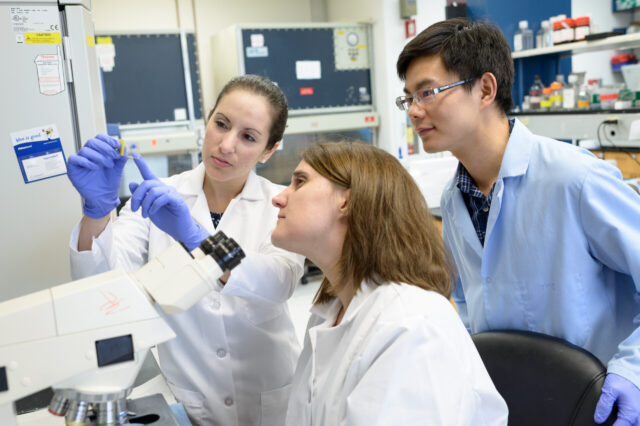This is a study to demonstrate the effect of oral ozanimod as maintenance therapy in participants with moderately to severely active Crohn's Disease.
- Investigator
- Angela Pham
- Status
- Accepting Candidates
- Ages
- 18 Years - 75 Years
- Sexes
- All
Update your location to show providers, locations, and services closest to you.
Crohn disease is a disease where parts of the digestive tract become inflamed.
Crohn disease is a form of inflammatory bowel disease (IBD).
Ulcerative colitis is a related condition.

Crohn's disease; Inflammatory bowel disease - Crohn's disease; Regional enteritis; Ileitis; Granulomatous ileocolitis; IBD - Crohn disease
The exact cause of Crohn disease is unknown. It occurs when your body's immune system mistakenly attacks and destroys healthy body tissue (autoimmune disorder).
When parts of the digestive tract remain swollen or inflamed, the walls of the intestines become thickened.
Factors that may play a role in Crohn disease include:
Crohn disease may occur at any age. It mostly begins in people between ages 15 and 35.
Symptoms depend on the part of the digestive tract involved. Symptoms range from mild to severe, and can come and go, with periods of flare-ups.
The main symptoms of Crohn disease are:
Other symptoms may include:

A physical exam may show a mass or tenderness in the abdomen, skin rash, swollen joints, or mouth ulcers.
Tests to diagnose Crohn disease include:
A stool culture may be done to check for other possible causes of the symptoms.
This disease may also alter the results of the following tests:
Tips for managing Crohn disease at home:
DIET AND NUTRITION
You should eat a well-balanced, healthy diet. Include enough calories, protein, and nutrients from a variety of food groups.
No specific diet has been shown to make Crohn disease symptoms better or worse. Types of food problems may vary from person to person.
Some foods can make diarrhea and gas worse. To help ease symptoms, try:
Ask your health care provider about extra vitamins and minerals you may need, such as:
If you have an ileostomy, you will need to learn:
STRESS
You may feel worried, embarrassed, or even sad and depressed about having a bowel disease. Other stressful events in your life, such as moving, a job loss, or the loss of a loved one can worsen digestive problems.
Ask your provider for tips on how to manage your stress.
MEDICINES
You can take medicine to treat very bad diarrhea. Loperamide (Imodium) can be bought without a prescription. Always talk to your provider before using these drugs.
Other medicines to help with symptoms include:
Your provider may also prescribe medicines to help control Crohn disease:
SURGERY
Some people with Crohn disease may need surgery to remove a damaged or diseased part of the intestine. In some cases, the entire large intestine is removed, with or without the rectum.
People who have Crohn disease that does not respond to medicines may need surgery to treat problems such as:
Surgeries that may be done include:
More information and support for people with Crohn disease and their families can be found at:
There is no cure for Crohn disease. The condition is marked by periods of improvement followed by flare-ups of symptoms. Crohn disease cannot be cured, even with surgery. But the surgical treatment can offer major help.
You have more risk for small bowel and colon cancer if you have Crohn disease. Your provider may suggest tests to screen for colon cancer. A colonoscopy is often recommended if you have had Crohn disease involving the colon for 8 or more years.
Those with more severe Crohn disease may have these problems:
Contact your provider if you:







Ananthakrishnan AN, Reguerio MD. Management of inflammatory bowel diseases. In: Feldman M, Friedman LS, Brandt LJ, eds. Sleisenger and Fordtran's Gastrointestinal and Liver Disease. 11th ed. Philadelphia, PA: Elsevier; 2021:chap 116.
Cameron J. Large bowel. In: Cameron J, ed. Current Surgical Therapy. 14th ed. Philadelphia, PA: Elsevier; 2023:177-286.
Galandiuk S, Netz U, Morpurgo E, Tosato SM, Abu-Freha N, Ellis CT. Colon and rectum. In: Townsend CM Jr, Beauchamp RD, Evers BM, Mattox KL, eds. Sabiston Textbook of Surgery. 21st ed. Philadelphia, PA: Elsevier; 2022:chap 52.
Kaplan GG, Ng SC. Epidemiology, pathogenesis, and diagnosis of inflammatory bowel diseases. In: Feldman M, Friedman LS, Brandt LJ, eds. Sleisenger and Fordtran's Gastrointestinal and Liver Disease. 11th ed. Philadelphia, PA: Elsevier; 2021:chap 115.
Lichtenstein GR. Inflammatory bowel disease. In: Goldman L, Schafer AI, eds. Goldman-Cecil Medicine. 26th ed. Philadelphia, PA: Elsevier; 2020:chap 132.
Lichtenstein GR, Loftus EV Jr, Isaacs KL, Regueiro MD, Gerson LB, Sands BE. Correction: ACG Clinical Guideline: management of Crohn's disease in adults. Am J Gastroenterol. 2018;113(4):481-517. PMID: 29895986 pubmed.ncbi.nlm.nih.gov/29895986/.
Sandborn WJ. Crohn's disease evaluation and treatment: clinical decision tool. Gastroenterology. 2014;147(3):702-705. PMID: 25046160 pubmed.ncbi.nlm.nih.gov/25046160/.
UF Health research scientists make medicine better every day. They discover new ways to help people by running clinical trials. When you join a clinical trial, you can get advanced medical care. Sometimes years before it's available everywhere. You can also help make medicine better for everyone else. If you'd like to learn more about clinical trials, visit our clinical trials page. Or click one of the links below:
This is a study to demonstrate the effect of oral ozanimod as maintenance therapy in participants with moderately to severely active Crohn's Disease.
This is a study to explore the effect of oral ozanimod as an induction treatment for participants with moderately to severely active Crohn's Disease.
This is an extension study to evaluate safety and efficacy of ozanimod in participants with moderately to severely active Crohn's Disease.
Our community and patient programs provide great value to patients, families and loved ones. People can find support, educational materials, expert consultants and more. In most instances, these programs are offered free of charge.
Support group made up of patients, family and friends of people who have IBD.
Support system for those students with inflammatory bowel disease.
April 23, 2015
An imbalance of bacteria in the gut can cause inflammation, a driver of conditions such as colitis, Crohn’s disease and colon cancer. Now University of Florida…
Department of Medicine, Department of Pathology, Immunology, and Laboratory Medicine, +4 more

If you don’t have Crohn’s disease, take a moment to thank your large family — or your childhood dog. A link between the inflammatory bowel disease and living arrangements in childhood may seem...